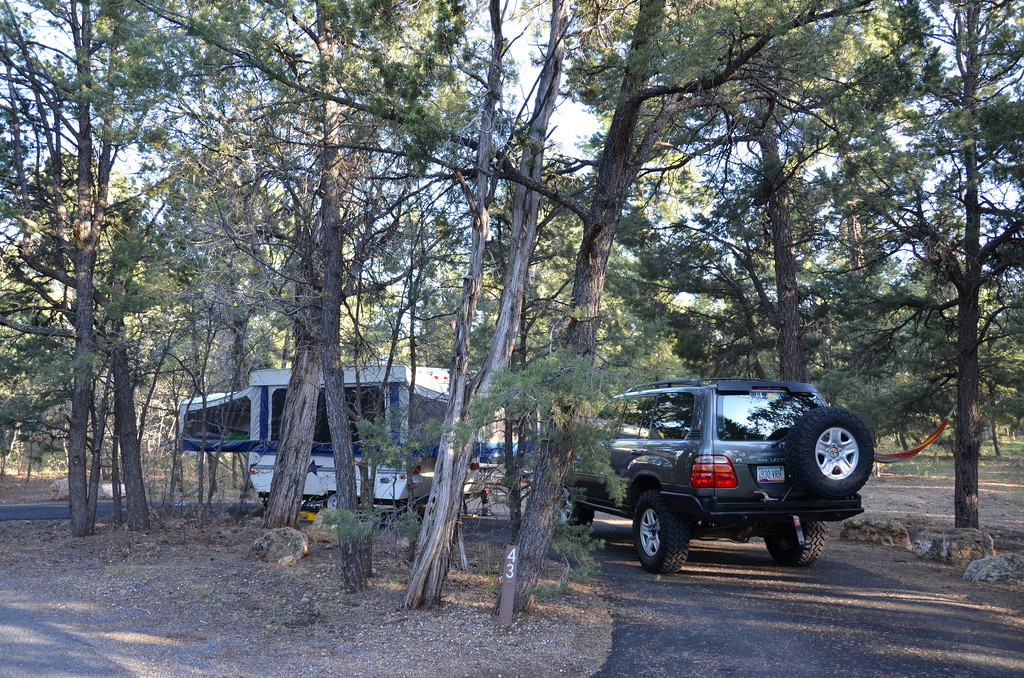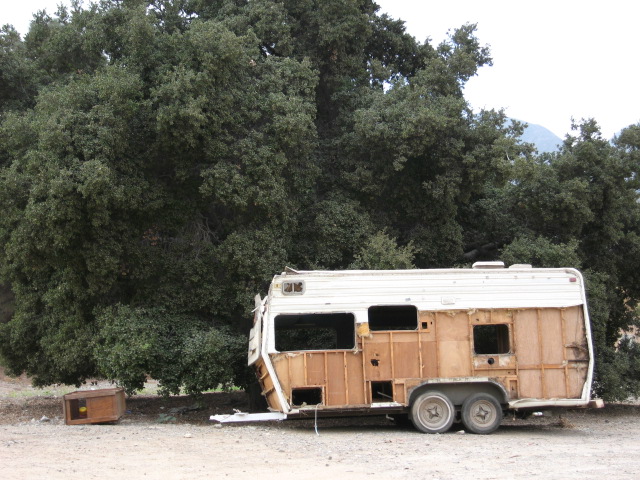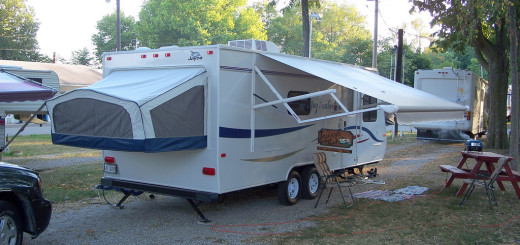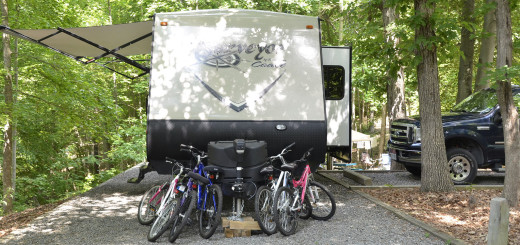So you’ve already been sold on the many benefits of a towable RV versus a motorized one, let alone other forms of temporary vacation housing, but you aren’t quite ready, or able, to spend big money on a brand new rig. That’s fine, and there are plenty of great older travel trailers out there, but even a used travel trailer represents a relatively large purchase, so there’s one phrase that you have to remember over all others as you go into this: caveat emptor. Buyer beware.
When you buy used travel trailers, you’re typically on your own. State lemon laws may apply to your purchase, but they usually don’t, and if you buy a used rig as is, and you discover some huge problem later on, then the onus is usually going to be on you as far as the law is concerned. That doesn’t mean that every used trailer salesman and FSBO is out to get you, but it does mean that you absolutely have to do your homework and check out a used trailer thoroughly before you lay down the cash.
In order to help you get ready to start looking for the perfect older travel trailer, we’ve put together a list of ten different items that you’ll want to check out or verify before you buy:
- Verify that you can safely tow the trailer with your truck, SUV or minivan.
- Inquire about any included or optional warranty.
- Check for structural issues with the frame, flooring, roof and walls.
- Verify the proper operation of any included appliances.
- Check the holding tanks and the operation of the knife valves.
- Test any onboard electrical systems.
- Check the batteries.
- Verify the operation and certification of the propane tank.
- Kick the tires.
- Make sure the floorplan meets your needs.
Don’t Buy if You Can’t Tow

Towing a used travel trailer is just the same as towing any other trailer. If your vehicle can’t handle a large trailer, find a smaller one. Image courtesy of Grand Canyon NPS, via Flickr (Creative Commons 2.0)
The issue of whether or not you can tow any given travel trailer is a delicate interplay between the capabilities of your tow vehicle and the weight of the trailer plus the weight of anything you load onto it. Before you go check out a used travel trailer, you’ll want to check out its GVWR and make sure that number is less than the towing capacity of the truck, van, or SUV that you drive. If the numbers don’t check out, you’ll want to focus your search on lightweight travel trailers going forward.
Additionally, you’ll want to make sure that the carrying capacity of the trailer, or the difference between its dry weight and GVWR, is large enough to handle everything that you want to be able to take camping with you.
If you find yourself at a used trailer lot without having first done the appropriate research, never just take the salesperson’s word that your vehicle can handle any particular trailer. You’ll want to, at the very least, look for the DOT plate on the trailer you’re interested in, which should provide its GVWR.
In order to determine your vehicle’s towing rating, you need to subtract its GVWR from its gross combination weight rating (GCWR). If the GVWR of the trailer is less than the towing capacity of your vehicle, with a ten to twenty percent safety margin, then you’re probably fine. There are other factors to take into consideration, like tongue weight and your hitch rating, which is why it’s a good idea to figure these things out before you go looking for a trailer.
Get the Warranty in Writing
If you buy a used travel trailer in a private sale, there probably won’t be any warranty to speak of. The seller is unlikely to want to cover any issues that develop down the line, and any factory warranties, whether or not they have ran out, may or may not even be transferable. However, some used travel trailers purchased from dealers do come with warranties.
If a warranty is offered, then you absolutely want to get it in writing. Make sure that the warranty spells out exactly how long the term is, whether it is good for 30, 60, 90 day or more, and exactly what it covers.
Check For Structural Issues and Damage
This can be tricky if you don’t have a lot of experience with RVs. Inspecting towable RVs like used travel trailers is simpler than inspecting motorhomes, since there is no drivetrain to be concerned about, but you may want to hire a professional if you’re uncomfortable with the process.

Not all structural damage is this easy to locate. Image courtesy of Miheco, via Flickr (Creative Commons 2.0)
If you do want to check it out yourself, you’ll want to go over the entire rig from the floor to the roof. Check for signs of roof leakage, which may include water stains on the ceiling or walls, peeling or discolored wall paper, warped paneling, and other signs. Soft floorboards inside and delaminated sidewalls outside are also signs of danger.
You may also want to slide under the rig to take a look at the frame, floorboards, and anything else you can see. Excessive amounts of rust on any metal components, or rotted wood components, are both signs that you may want to step away from the purchase.
Make Sure the Appliances Work
If the included appliances don’t work, that should be reflected in the purchase price. For instance, RV fridges are extremely expensive to replace, so you’ll want to verify that the fridge works on both gas and electrical modes. It takes some time for an RV fridge to cool down, so if you’re buying from a private party, you may want to ask them to turn it on in advance of your visit. If the fridge isn’t somewhere in the 38 to 42°F range, there may be a problem.
Another important appliance is the hot water heater, which can rupture if the system isn’t properly drained in the winter. You’ll want to check that it not only provides hot water, but that it also doesn’t leak. Hot water heaters can also be expensive and difficult to replace.
Other appliances, like air conditioning, microwaves, stoves, ovens, and even built-in coffee makers are often included, and testing procedures are more or less self explanatory. You may want to boil a cup of water in the microwave to make sure it works, try the burners on the stove, etcetera. If anything doesn’t work, ask the seller to have it fixed, or see if you can adjust the purchase price accordingly.
Check the Holding Tanks
Used travel trailers have three primary holding tanks that you need to be concerned about, which hold fresh water, waste water from the sinks and shower, and waste water from the toilet, respectively. In order to test the faucets and hot water heater, the seller will have to put water in the fresh water tank, which will allow you to verify that it holds water and doesn’t leak.
The black and gray water tanks, on the other hand, should be empty, which makes it impossible to check for leaks. However, as they should be empty, you can take the opportunity to check the knife valves. If the drain valves don’t slide in and out smoothly, they may require repairs. If the tanks aren’t empty, on the other hand, that may indicate that the valves are broken altogether, which is a messy problem to fix.
Test the Operation of the Electrical System
Whether the rig is running on batteries or plugged into 120V AC, you’ll want to verify that all of the interior and exterior lights operate. If any are burned out, you may want to ask for the seller to replace them in order to make sure that the actual fixtures work. If the rig includes a system monitor, you will also want to verify that it works and correctly reports the battery level, tank levels, and propane level.
Check the Battery Compartment
Even if the lights turn on just fine without the trailer being plugged into AC power, you’ll still want to check the battery compartment. If you find regular automotive batteries instead of deep cycle batteries, that’s a red flag. Deep cycle batteries are required for RV applications, and they are relatively expensive to replace. You should also look for signs of corrosion on the battery terminals and cables. Corrosion can be cleaned, but it may be a sign that the battery itself is leaking.
Check the Propane Tank
Although it isn’t possible to check for leaks in a propane tank without the proper training and equipment, you can check whether or not the seller has propane in it and whether the gauge on the tank and the gauge on the system monitor work. You can also look for signs of rust or damage and check the DOT certification stamp on the tank.
Check the Tires for Wear and Damage
Tires wear out due to actual wear and tear and factors like age and UV damage. If the treads are excessively worn, or you can see bulges or signs of steel cords wearing through, then you’ll want to replace the tires immediately, and the purchase price should reflect that expense. On the other hand, if the tires are more than six or seven years old, you will still have to replace them soon after buying the rig even if they look great.
Never take the seller’s word on the condition of the tires, and don’t necessarily believe your eyes, either. Tires actually have codes on them that you can read to determine the age of the tire, and that’s the only number you should actually believe. If the rig is only a few years old, and the tires look good, then you’re probably fine. If it’s six or more years old, then you’ll want to verify the date code before you set off on a long road trip.
Don’t Buy It If You Don’t Love It
When everything else is said and done, the floorplan and design touches are probably more important than anything else when it comes to buying a used travel trailer. Yeah it’s vital to make sure that the trailer isn’t going to fall apart on the way home, but you can fix most of the issues outlined above, while a bad floorplan is something that you’ll just have to live with. And since buying a used travel trailer is often such a large expense, you may have to live with it for a good, long while.

Your used travel trailer might not look like this, but that doesn’t mean you have to settle for something you don’t love. Image courtesy of Millennium Luxury Coaches, via Flickr (Creative Commons 2.0)
There are two major factors to look at in the floorplans of used travel trailers: the layout and the actual features. The layout affects how you will live and flow in your new rig, so you’ll want to look at things like how easy it is to get into, whether you have to step around things to move through it, where facilities like the bathroom and kitchen are placed, among other factors. For instance, if you have kids, you may want to stay away from a floorplan that requires them to walk through the master bedroom at night to reach the bathroom.
Other factors, like how much seating and sleeping space a rig has, are easier to quantify. If you are by yourself, or only plan on traveling with one other person, then the configuration of your daytime living space will be far more important than how much sleeping space there is. You will also want to consider factors like whether you would prefer a dinette or a couch, if you’re looking at trailers that only have space for one.
It may also be useful to actually sit at the dinette, on the couch, and in other locations around the trailer, to get an idea for how comfortable it will be to live or vacation in. You can also lay down on the bed, or fold down the dinette or couch to lay there, as RV sleeping spaces are often more cramped than you may be used to. You can also sit down on the toilet, with the lid closed, of course, to make sure you will be comfortable there, and even stand in the shower to make sure it has enough space.
There are so many different factors to consider when looking at used travel trailers that it can turn into an overwhelming and stressful experience, especially for first-time buyers, but if you break it down into easy to digest chunks, and pay attention to the items outlined above, there’s no doubt that you’ll be able to find the perfect used travel trailer to enjoy for years, or even decades, to come.



